第六讲 时态时态:进行表将来课件 2022届高考英语语法点复习课件(13张PPT)
文档属性
| 名称 | 第六讲 时态时态:进行表将来课件 2022届高考英语语法点复习课件(13张PPT) | 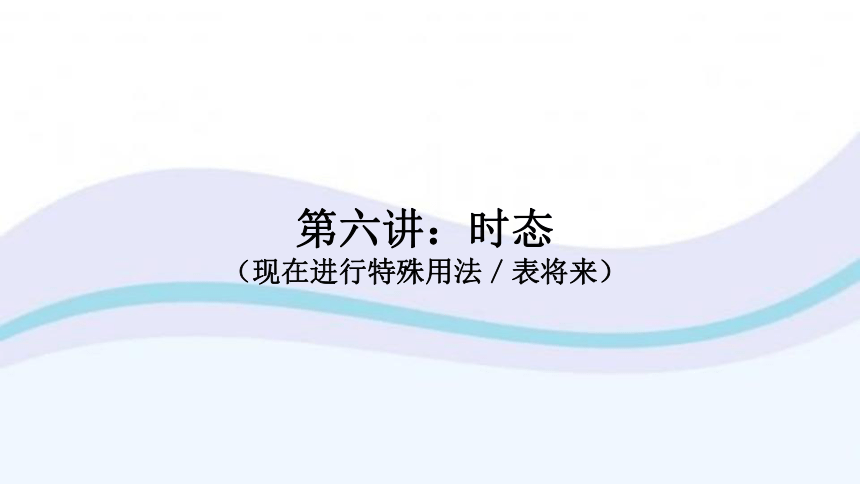 | |
| 格式 | zip | ||
| 文件大小 | 116.6KB | ||
| 资源类型 | 教案 | ||
| 版本资源 | 通用版 | ||
| 科目 | 英语 | ||
| 更新时间 | 2021-11-04 10:07:51 | ||
图片预览

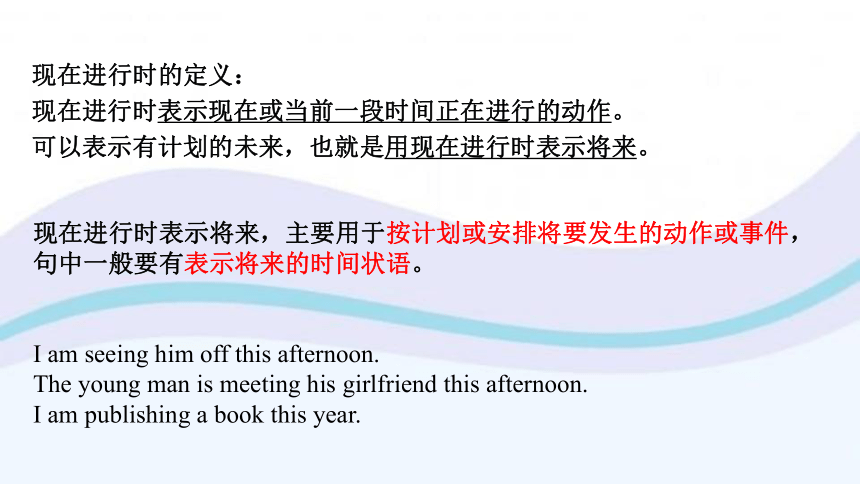
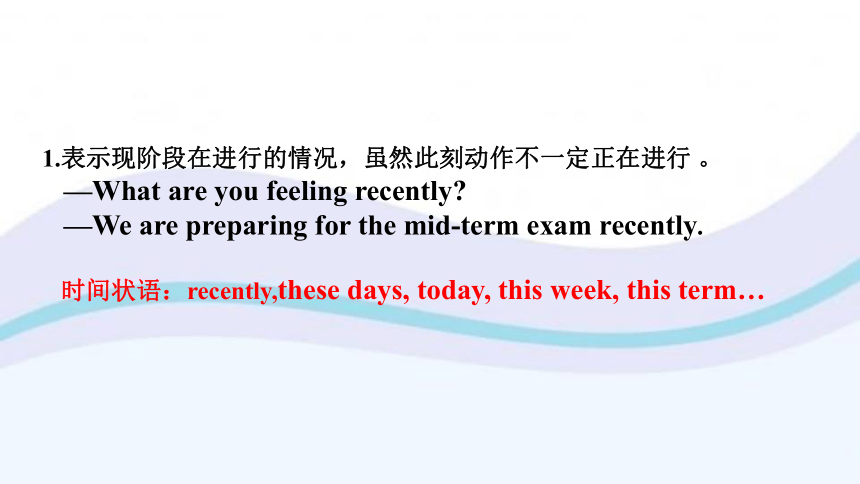
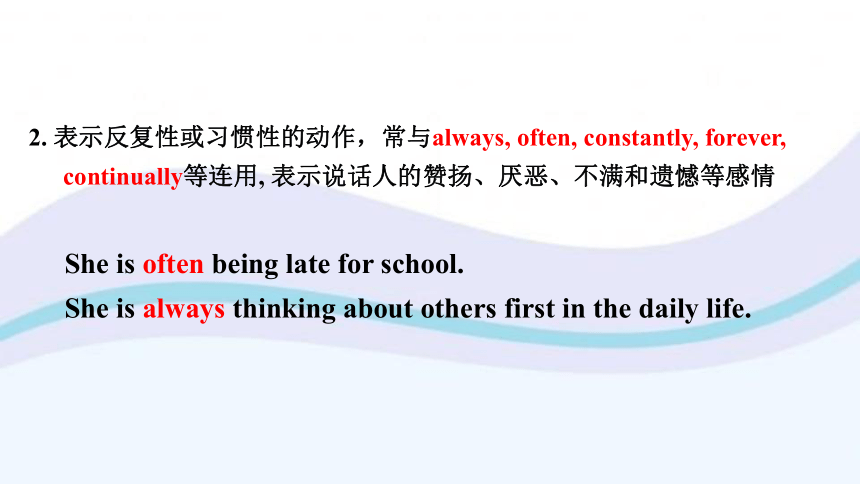
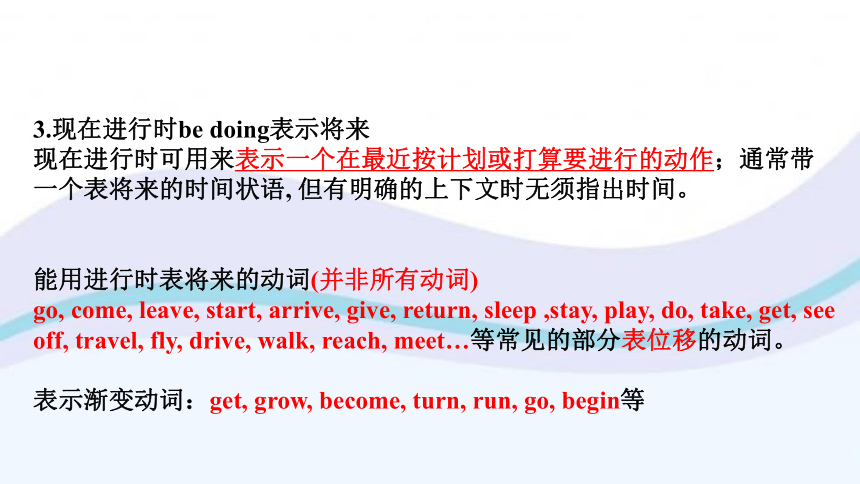
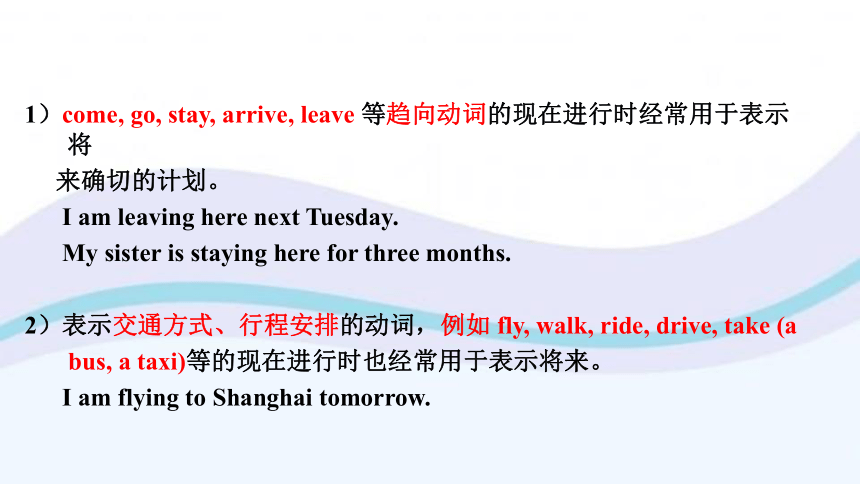
文档简介
(共13张PPT)
第六讲:时态
(现在进行特殊用法/表将来)
现在进行时的定义:
现在进行时表示现在或当前一段时间正在进行的动作。
可以表示有计划的未来,也就是用现在进行时表示将来。
现在进行时表示将来,主要用于按计划或安排将要发生的动作或事件,
句中一般要有表示将来的时间状语。
I am seeing him off this afternoon.
The young man is meeting his girlfriend this afternoon.
I am publishing a book this year.
1.表示现阶段在进行的情况,虽然此刻动作不一定正在进行 。
—What are you feeling recently
—We are preparing for the mid-term exam recently.
时间状语:recently,these days, today, this week, this term…
2. 表示反复性或习惯性的动作,常与always, often, constantly, forever, continually等连用, 表示说话人的赞扬、厌恶、不满和遗憾等感情
She is often being late for school.
She is always thinking about others first in the daily life.
3.现在进行时be doing表示将来
现在进行时可用来表示一个在最近按计划或打算要进行的动作;通常带一个表将来的时间状语, 但有明确的上下文时无须指出时间。
能用进行时表将来的动词(并非所有动词)
go, come, leave, start, arrive, give, return, sleep ,stay, play, do, take, get, see off, travel, fly, drive, walk, reach, meet…等常见的部分表位移的动词。
表示渐变动词:get, grow, become, turn, run, go, begin等
1)come, go, stay, arrive, leave 等趋向动词的现在进行时经常用于表示将
来确切的计划。
I am leaving here next Tuesday.
My sister is staying here for three months.
2)表示交通方式、行程安排的动词,例如 fly, walk, ride, drive, take (a
bus, a taxi)等的现在进行时也经常用于表示将来。
I am flying to Shanghai tomorrow.
4.表示马上就要发生的动作
Let’s hurry up. It is beginning to rain.
Keep calm, please. I am arriving.
注意: 用现在进行时表示一般将来时,在句中或上下文通常有表示将来
时间的状语或其他依据,否则意义便含糊不清.
Are you doing anything special tonight (表示将来)
Are you doing anything special now (表示说话时正在进行的动作)
Are you doing anything special (可作以上两种解释)
现在进行时表示现在和将来的区别
1、现在进行时表示现在,其时间状语为表示具体时刻的句子(it’s sever
o’clock 等)或词语(now等),有时候也使用祈使句或listen, look等
提示词来标志时间。
Be quite!The baby is sleeping.
She is doing her homework now.
It’s six o’clock in the evening. The Greens are having their supper.
2、现在进行时表示将来,其后所跟时间状语必须是表示将来的时间
I’m going shopping tomorrow.
Jim is visiting his friend in America next week.
将来动作的其他表达方法:
1.will/shall+动词原形,表示客观上将来某个时间要发生的动作或存在的状态;
或表示自然趋势或非主语意志。
He will write you a letter next week.
I shall be sixteen years old next month.
---Sorry, I forgot to post the letter for you.
---It doesn’t matter. I will post it myself.
注意:will 还可用来表临时决定
2. be going to +动词原形,表示“就要…”,“打算…”或将要发生的事。表示眼前主观上要去做的事,或有迹象表明要发生的事,与自己的意志无关。
---what are you going to do tonight
---I’m going to watch the football match on TV.
Look! It seems to be going to rain.
3.be to do 表示预定,按计划或安排将发生某事
Are we to go on with this work
They are to get married next month.
4.be about to do 表示即将要做某事,表示非常近的将来,但不能与表示确
切时间的时间状语连用,构成be about to do …when...,意为“正要…这/那时”
I was just about to go to bed when someone called me up.
She was about to leave when some guests came.
1. I am leaving (leave)in a minute. I _will finish _(finish) all my work before I
_____leave__(leave).
2. —How long ____will ___ you ____study_(study)in our country
—I ____plan___(plan)to be here for about one more year.
—I ____hope___(hope)to visit the other parts of your country.
—What ___will____ you ____do___(do)after you ___leave____(leave)here
—I ____will return ___(return)home and ___get____(get)a job.
3. I ___will write_____(write) the composition tonight.
4. Mary’s birthday is next Monday, her mother _will give
_(give) her a present.
Betty is leaving (leave) for Guangzhou by plane at 3:00 this afternoon. Her brother Bob _is seeing __ (see) her off. It’s half past one now. They are waiting (wait) for a taxi outside the school gate.
2. The Browns are going (go) to the North China by train next week. They ____are staying __are going __ (stay) in Beijing for a week. They (go) to Xi’an. They ___ are getting __ (get) there by air.
3. Some friends are coming (come) to Anne’s birthday party this evening. Anne’s mother _ is __ _ (be) busy getting (get) ready for the birthday dinner. Anne ____is helping_ _ (help) her mother now.
第六讲:时态
(现在进行特殊用法/表将来)
现在进行时的定义:
现在进行时表示现在或当前一段时间正在进行的动作。
可以表示有计划的未来,也就是用现在进行时表示将来。
现在进行时表示将来,主要用于按计划或安排将要发生的动作或事件,
句中一般要有表示将来的时间状语。
I am seeing him off this afternoon.
The young man is meeting his girlfriend this afternoon.
I am publishing a book this year.
1.表示现阶段在进行的情况,虽然此刻动作不一定正在进行 。
—What are you feeling recently
—We are preparing for the mid-term exam recently.
时间状语:recently,these days, today, this week, this term…
2. 表示反复性或习惯性的动作,常与always, often, constantly, forever, continually等连用, 表示说话人的赞扬、厌恶、不满和遗憾等感情
She is often being late for school.
She is always thinking about others first in the daily life.
3.现在进行时be doing表示将来
现在进行时可用来表示一个在最近按计划或打算要进行的动作;通常带一个表将来的时间状语, 但有明确的上下文时无须指出时间。
能用进行时表将来的动词(并非所有动词)
go, come, leave, start, arrive, give, return, sleep ,stay, play, do, take, get, see off, travel, fly, drive, walk, reach, meet…等常见的部分表位移的动词。
表示渐变动词:get, grow, become, turn, run, go, begin等
1)come, go, stay, arrive, leave 等趋向动词的现在进行时经常用于表示将
来确切的计划。
I am leaving here next Tuesday.
My sister is staying here for three months.
2)表示交通方式、行程安排的动词,例如 fly, walk, ride, drive, take (a
bus, a taxi)等的现在进行时也经常用于表示将来。
I am flying to Shanghai tomorrow.
4.表示马上就要发生的动作
Let’s hurry up. It is beginning to rain.
Keep calm, please. I am arriving.
注意: 用现在进行时表示一般将来时,在句中或上下文通常有表示将来
时间的状语或其他依据,否则意义便含糊不清.
Are you doing anything special tonight (表示将来)
Are you doing anything special now (表示说话时正在进行的动作)
Are you doing anything special (可作以上两种解释)
现在进行时表示现在和将来的区别
1、现在进行时表示现在,其时间状语为表示具体时刻的句子(it’s sever
o’clock 等)或词语(now等),有时候也使用祈使句或listen, look等
提示词来标志时间。
Be quite!The baby is sleeping.
She is doing her homework now.
It’s six o’clock in the evening. The Greens are having their supper.
2、现在进行时表示将来,其后所跟时间状语必须是表示将来的时间
I’m going shopping tomorrow.
Jim is visiting his friend in America next week.
将来动作的其他表达方法:
1.will/shall+动词原形,表示客观上将来某个时间要发生的动作或存在的状态;
或表示自然趋势或非主语意志。
He will write you a letter next week.
I shall be sixteen years old next month.
---Sorry, I forgot to post the letter for you.
---It doesn’t matter. I will post it myself.
注意:will 还可用来表临时决定
2. be going to +动词原形,表示“就要…”,“打算…”或将要发生的事。表示眼前主观上要去做的事,或有迹象表明要发生的事,与自己的意志无关。
---what are you going to do tonight
---I’m going to watch the football match on TV.
Look! It seems to be going to rain.
3.be to do 表示预定,按计划或安排将发生某事
Are we to go on with this work
They are to get married next month.
4.be about to do 表示即将要做某事,表示非常近的将来,但不能与表示确
切时间的时间状语连用,构成be about to do …when...,意为“正要…这/那时”
I was just about to go to bed when someone called me up.
She was about to leave when some guests came.
1. I am leaving (leave)in a minute. I _will finish _(finish) all my work before I
_____leave__(leave).
2. —How long ____will ___ you ____study_(study)in our country
—I ____plan___(plan)to be here for about one more year.
—I ____hope___(hope)to visit the other parts of your country.
—What ___will____ you ____do___(do)after you ___leave____(leave)here
—I ____will return ___(return)home and ___get____(get)a job.
3. I ___will write_____(write) the composition tonight.
4. Mary’s birthday is next Monday, her mother _will give
_(give) her a present.
Betty is leaving (leave) for Guangzhou by plane at 3:00 this afternoon. Her brother Bob _is seeing __ (see) her off. It’s half past one now. They are waiting (wait) for a taxi outside the school gate.
2. The Browns are going (go) to the North China by train next week. They ____are staying __are going __ (stay) in Beijing for a week. They (go) to Xi’an. They ___ are getting __ (get) there by air.
3. Some friends are coming (come) to Anne’s birthday party this evening. Anne’s mother _ is __ _ (be) busy getting (get) ready for the birthday dinner. Anne ____is helping_ _ (help) her mother now.
